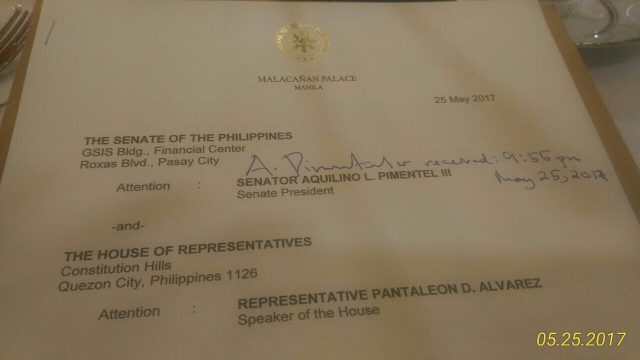MANILA — The President’s written report citing the basis for declaring martial law in Mindanao was received by Senate President Koko Pimentel late Thursday (May 25) night, in compliance with a constitutional requirement for Congress to be given such within 48 hours of the proclamation.
Pimentel, who was in Davao City with President Rodrigo Duterte, signed the receiving copy at 9:55 p.m. Duterte had convened his Cabinet in his home city a day after flying home from Russia, a trip he cut short by three days on learning of the Marawi siege by Maute Group bandits.
Hours after being briefed, while still in Moscow, of the events in Marawi, Duterte issued Proclamation 216 declaring the entire Mindanao under martial law and suspending the privilege of the writ of habeas corpus.
On Wednesday night, the Palace formally transmitted to House Speaker Pantaleon Alvarez the declaration placing Mindanao under martial law.
Proclamation No. 216 states, “There is hereby declared a state of martial law in the Mindanao group of island for a period not exceeding 60 days” effective May 23, 2017.
The Constitution requires the President to render a report to Congress – either in person or in writing – stating the basis for the martial law proclamation, which Congress may either revoke by a majority vote or let stand.
The exact provision says: “Within forty-eight hours from the proclamation of martial law or the suspension of the privilege of the writ of habeas corpus, the President shall submit a report in person or in writing to the Congress. The Congress, voting jointly, by a vote of at least a majority of all its Members in regular or special session, may revoke such proclamation or suspension, which revocation shall not be set aside by the President. Upon the initiative of the President, the Congress may, in the same manner, extend such proclamation or suspension for a period to be determined by the Congress, if the invasion or rebellion shall persist and public safety requires it.”
Convene or not? Debate continues
Meanwhile, the lawmakers were split on whether the two chambers of Congress should convene in joint session to approve the proclamation.
Earlier, leaders of the House said there is no need for them to approve President Rodrigo Duterte’s declaration of martial law in Mindanao.
House Majority Leader Rodolfo Farinas said the agreement reached with Senate Majority Leader Vicente Sotto III was for the lawmakers to be briefed by the Executive Secretary, Secretary of Department of National Defense, Secretary of the Interior, and other concerned officials on Duterte’s report explaining why he declared martial law.
The Senate briefing is scheduled for Monday, May 29, that for the House on Wednesday, May 31.
The information divulged and discussions during the executive sessions will not be divulged to the public.
Fariñas said he would propose in plenary on Monday that the House constitute itself into a Committee of the Whole — meaning all 292 members — for Wednesday’s briefing.
Other Cabinet Secretaries will also be invited, he said.
But debate continued to rage about the need for Congress to approve the martial law declaration.
Sen. Kiko Pangilinan disagreed with the stand of Speaker Pantaleon Alvarez and Fariñas that the Constitution does not require congressional approval by both chambers in joint session.
“With all due respect to our esteemed colleagues, Congress must hold a joint session on the declaration of martial law and the suspension of the privilege of writ of habeas corpus — in a public and transparent manner and in an official proceeding,” Pangilinan said in a statement.
“If very sensitive matters may compromise the ongoing operations and safety of our men in uniform, then we can go into executive session.
“Granted, Article VII Section 18 of the Constitution does not mandate Congress to approve these two extraordinary executive powers that affect the rights of millions of people.
“Yet, public accountability, transparency, and the right of our people to be informed of matters of public interest are all constitutional tenets, and thus form constitutional bases for the joint session.”
Click and watch this video report from News5’s Maricel Halili below:










